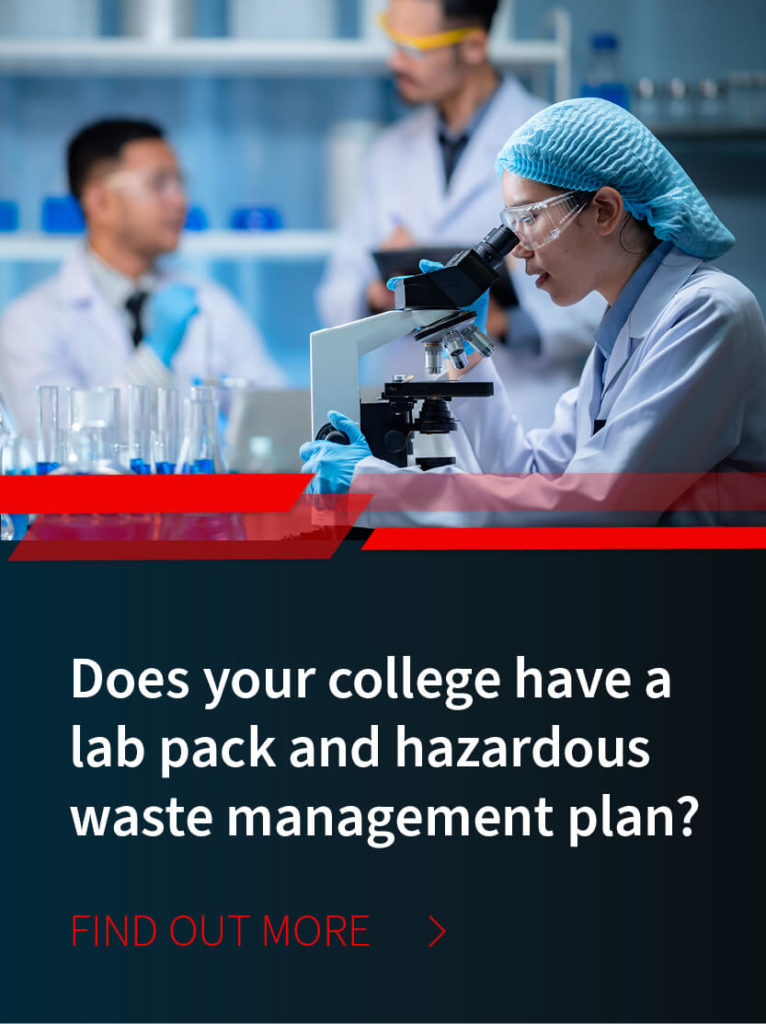
/ IN THIS BLOG
Colleges need to effectively manage hazardous waste, but that process can be filled with many challenges. Laboratory waste in particular requires special attention due to the wide array of chemicals and hazardous materials that accumulate in these settings. Ensuring proper lab pack management for schools not only protects your institution from compliance violations but also keeps your students, staff, and the environment safe.
Whether you're a seasoned administrator who knows every detail of your waste inventory or unsure where to begin, creating a lab pack checklist is an effective place to start. Learn some tips for navigating the essentials of lab pack management in your school.
01 / What Is Lab Pack Management for Schools?
Lab pack management refers to the process of identifying, packing, and safely disposing of hazardous chemicals and materials in compliance with both local as well as state and federal regulations. For colleges, this means organizing waste from classrooms, labs, and other facilities into manageable containers for safe transportation and disposal by a certified provider like MCF Environmental Services.
Improper handling of these materials can result in serious consequences, which includes hefty fines, environmental harm, and significant risks to student and staff health. A proper lab pack checklist ensures your college stays compliant while streamlining the entire process to make it practical for everyone to follow.
02 / Lab Pack Management for Schools Comes with Unique Challenges
College and university environments often combine students and staff who have a wide range of familiarity and preparedness when it comes to hazardous materials. Some administrators and staff have an extensive understanding of their hazardous materials, while others may be starting from scratch. A reliable process helps to ensure success in either case.
Some labs maintain detailed inventories, with clear records of chemical names, weights, and container sizes. This organized approach can allow for quick and efficient communication with lab pack service providers, streamlining the entire process.
On the other hand, some staff may encounter challenges, such as unlabeled or poorly stored materials, or simply being unfamiliar with materials. Faded labels, cluttered storage areas, or incomplete records can make the task feel overwhelming. In these cases, detailed photos or input from a chemist often become essential steps toward proper identification and disposal. MCF Environmental for example provides on-site assistance from trained chemists for those locations that need it.
No matter where you or your team fall on this spectrum, the right tools and support—like a comprehensive lab pack checklist—can bridge any gaps, ensuring a safe, compliant, and efficient process.
03 / Why a Lab Pack Checklist Matters
A checklist helps ensure you don’t overlook key details during lab pack management. For experienced administrators, it keeps the process efficient and thorough, while for those less familiar with hazardous waste, it provides a roadmap for compliance and safety.
Proper lab pack management is critical in ensuring that colleges and universities handle hazardous materials safely and in full compliance with regulations. A checklist is an invaluable tool, offering benefits that extend beyond convenience. It provides a structured, repeatable and standardized approach to safety that helps avoid costly and potentially dangerous mistakes. There are many benefits to maintaining a checklist, but these are some of the most important:
A Lab Pack Checklist Ensures Safety in the University Environment
With a large student body and staff population, safety is a significant priority in a college setting. Hazardous materials—such as flammable, corrosive, or reactive chemicals—pose significant risks if mishandled.
A checklist helps ensure all materials are stored, packed, and disposed of in a way that minimizes danger. Unlike general waste, many laboratory materials cannot just be packed together for disposal. Critical safety protocols, such as proper segregation, must be followed. One example of this is with flammable waste, which must never be stored with reactive or corrosive substances, because this can lead to dangerous chemical reactions.
By following a detailed checklist, school staff can systematically identify potential risks and mitigate them, helping protect everyone on campus from harmful incidents. It ensures compliance with local, state, and federal regulations, reducing liability while creating a safer learning and working environment.
Avoid Financial Penalties for Noncompliance with a Comprehensive Plan
Improper disposal of hazardous waste can result in severe financial consequences. Noncompliance with regulations may lead to hefty fines, lawsuits, and damage to your institution’s reputation. A checklist ensures all required steps are taken to meet compliance standards, from proper labeling to accurate documentation and secure transportation.
Beyond avoiding fines, adhering to proper procedures protects a school from potential lawsuits and maintains its reputation as a responsible institution. Transparency and compliance also demonstrate a commitment to environmental stewardship, safety, and legal accountability, all of which strengthens the image of the school to students, staff, and stakeholders.
Lab Pack Checklists Provide Peace of Mind
When handling hazardous waste, the smallest oversight can have serious consequences. A checklist serves as a safeguard that makes sure every step of the disposal process is followed — from identifying materials to securing their safe storage and disposal.
For less experienced staff, a lab pack checklist is an essential roadmap, providing clear direction in what can sometimes be an overwhelming process. It can also act as a fail-safe for seasoned professionals to ensure nothing is forgotten, even under tight deadlines or in hectic environments.
Knowing you’re following a reliable, comprehensive plan offers peace of mind, allowing you to focus on other responsibilities without second-guessing your process. Whether you’re new to lab pack management or have years of experience, a checklist is an essential resource for handling hazardous waste safely and efficiently.
04 / What Should a Comprehensive Lab Pack Checklist Include
When crafting a lab pack checklist, you want to make sure it’s both comprehensive and easy to understand. MCF Environmental Services offers clients support and guidance in creating a solid lab pack checklist. We have the experience with schools and universities to provide the insights necessary to create a checklist that’s right for your school. Since every school has different needs, the following is a good starting point for steps to include, but not an exhaustive list.
Inventory the Waste
Record all hazardous chemicals and materials.
Include details such as names, quantities, container sizes, and conditions.
Take photos of containers with faded or missing labels for identification.
Assess Storage Conditions
Ensure chemicals are stored in appropriate containers with secure lids.
Separate incompatible materials to prevent dangerous reactions.
Label each container clearly (if possible) to match your inventory.
Organize Waste by Category
Group materials based on compatibility (e.g., flammables, corrosives, oxidizers).
Avoid mixing different types of waste in the same container.
Understand Regulations
Familiarize students and staff with EPA guidelines and state-specific rules.
Keep Material Safety Data Sheets (MSDS) on hand for reference.
Coordinate with Your Lab Pack Service Provider
Share your inventory or photos with your provider.
Communicate clearly about unknown or unlabeled materials.
Schedule a site visit if necessary to ensure accurate identification and quoting.
Partnering with the Right Lab Pack Management Service is the First Step to Safety and Compliance
MCF Environmental offers expert lab pack management for schools, with tailored services to meet your specific needs. From identifying unlabeled chemicals to ensuring every container is properly packed and documented, the experienced MCF team provides the support you need to stay compliant and safe. Our team is ready to help you build a comprehensive lab pack checklist and provide reliable disposal services.
Manage hazardous waste confidently and efficiently with a plan and the right partner to keep everyone in your facilities safe. Schedule a consultation to learn more about our hazardous waste services for colleges and universities.
Robert Losurdo
President, COO








